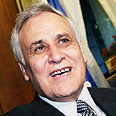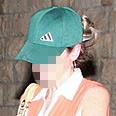

Mazuz orders probe into Katsav blackmail affair
Attorney General Mazuz orders police to launch investigation into blackmailing affair involving president. In letter to Mazuz, president claims his alleged blackmail by former secretary was not related to sexual harassment charges; states woman threatened to say he granted amnesties for money. Experts says president can be summoned for interrogation only upon attorney general's approval
On Wednesday morning police will launch one of the most complex and tangled inquiries it has been tasked with for a long time. At the center of the investigation: President Moshe Katsav, a former employee, a blackmail that maybe didn’t happen and an incident of sexual harassment which no one filed a complaint about.
Attorney General Menachem Mazuz instructed the launch of the investigation Tuesday after receiving a letter from the president, in which Katsav states his alleged blackmailing by a former secretary did not involve sexual harassment charges.
On Wednesday, police Chief Moshe Karadi is set to hold a meeting with Danino on the police's handling of the affair. The two officers are expected to decide which unit will be assigned the investigation, and whether or not to establish a special inquiry team.
Will more women join charges?
A senior police official told Ynet that it was too soon to establish whether the president himself would be probed in the affair. Another possibility that was being examined was that Katsav would be asked to testify in the case, the official said. “During inquiries, we generally investigate both sides,” he said. “After the first round of investigations, we’ll know in which direction it will develop.”
So what will the next few days look like? In the halls of the justice establishment, there is talk that during the investigation – possibly through various media channels –more women will join the charges claiming some relation or other with the president. Professor Emanuel Gross, a criminal law expert, assessed that the former employee would be asked to give testimony or would be probed.
"I suppose that the president was merely trying to call the attorney general's attention to the fact it wasn't certain from the beginning whether there was a criminal aspect to that behavior. The president said he was baffled as to where the idea of sexual harassment came from," he said.
President may testify
"The important issue is what details the president gave to the attorney general in their meeting," Prof. Gross told Ynet.
Gross estimates that during the initial stages of the investigation, "the police will apparently ask for the information the attorney general has in his possession, and collect additional information…then the secretary will probably be summoned to give her own version of the affair."
The professor stressed that the police were not allowed to interrogate the president, unless the attorney general has authorized such questioning. If the president is called to testify, he will be the one choosing the place and time, he explained.
Katsav's letter: No criminal intent
President Moshe Katsav relayed to the attorney general Tuesday evening a letter related to his alleged blackmail by a former employee. In the letter, Katsav details the events leading to the affair, and stresses that the blackmail was not based on sexual harassment claims.
"On July 5, 2006 I reported to you of an incident that took place in my office that appeared to have been a blackmailing attempt. During our meeting I stressed before you that I doubt whether she (the former secretary) meant what she had said, as it seemed that she was in a difficult personal, family, mental and financial condition," Katsav wrote.
"I am not backing down on my stance during our meeting, in which I gave you a letter stating that 'I cannot determine whether criminal acts were carried out, despite the fact it sometimes appeared so. I believe that not every emotional turmoil accompanied by psychological outbursts bears with it criminal intent'," he wrote.
According to Katsav's letter, the woman threatened to publicly accuse him of granting amnesties in exchange for money, which has been deposited in accounts abroad. "I believe that anyone familiar with the processes of granting amnesty in the Justice Ministry and my office knows that this accusation is baseless. This is why I also didn't think it was serious."
The president wrote he was puzzled as to why a story stating he had been blackmailed over sexual harassment charges would be leaked to the press. "The lady did not file a complaint that I sexually harassed her," he wrote, adding that "since I have nothing to hide, I will respect any decision you make."
Aviram Zino, Ilan Marciano and Ahiya Raved contributed to the report















